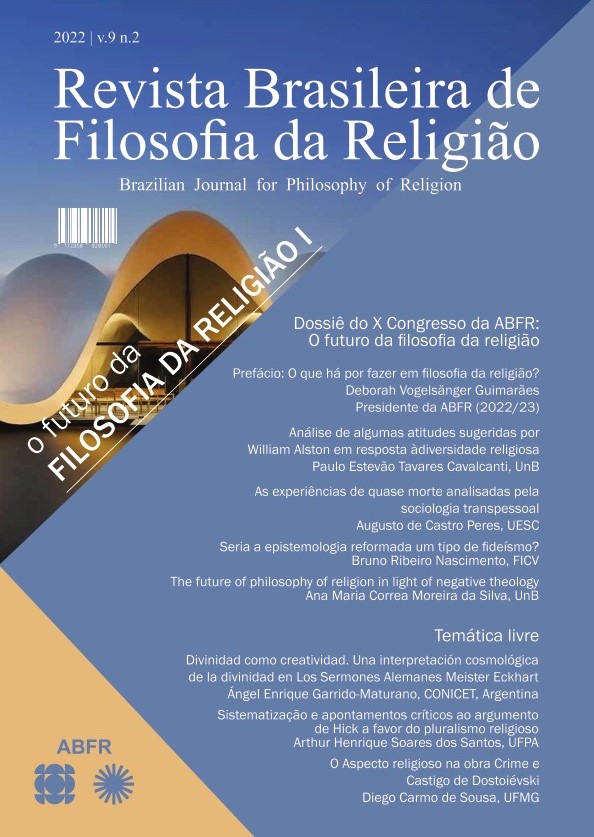The future of philosophy of religion in light of negative theology
DOI:
https://doi.org/10.26512/2358-82842022e51716Palabras clave:
Philosophy of Religion, Negative Philosophy, Apophatic Eschatology, Mysticism, HopeResumen
In this paper, we advocate for the application of the apophatic method to both Theology and its branch, Eschatology. This defense is grounded in the assumption that, similar to the ineffability of God, the ineffability of the afterlife requires intellectual humility and openness to the myriad possibilities that the future may bring. We posit that adopting this methodological stance, rooted in the concept of negation, can ensure the future of the philosophy of religion amidst its main challenges, which arise from its object of study at the intersection of philosophy and theology. By recognizing the inherent limitations of religious language, Apophaticism emerges as a philosophical concept capable of enhancing inter-religious and intra-religious dialogue, as well as conversations with secular humanists in general. The concept of Hope also plays a crucial role in this approach, serving as a common denominator that brings together different theorical perspectives.
Referencias
AQUINAS, Thomas (2006). The Summa Theologica. Translated by Fathers of the English Dominican Province. https://www.documentacatholicaomnia.eu.
BROWNS, Nahum, and J. Aaron Simmons (Eds.) (2017). Contemporary Debates in Negative Theology and Philosophy. London: Palgrave Macmillan.
COAKLEY, Sarah (2009). “Dark Contemplation and Epistemic Transformation: The Analytic Theologian Re-Meets Teresa of Avila” in Analytic Theology: New Essays in the Philosophy of Theology, by O. Crisp and M. Rea. Oxford University Press: 280-312.
CRISP, Oliver, and Michael Rea (Eds.) (2009). Analytic Theology: New Essays in the Philosophy of Theology. Oxford: Oxford University Press.
DIONÍSIO Pseudo-Areopagita (2004). Dos Nomes Divinos. Bento da Silva Santos (Introdução, Tradução e Notas). São Paulo: Attar Editorial.
ELLIOT, David (2017). Hope and Christian Ethics. New York: Cambridge University Press.
FRANKE, William (2000). “Apocalypse and the breaking-open of Dialogue: a negatively theological perspective”. International Journal for Philosophy of Religion, 47: 65–86.
FRANKE, William (2014). A Philosophy of the Unsayable. Notre Dame: University of Notre Dame Press.
GRESHAKE, Gisberg, and Gerhard Lohfink (1975). Naherwartung, Auferstehung, Unsterblichkeit. Untersuchungen zur christilichen Eschatologie. Quaestiones Disputatae (QD) 71. Freiburg: Herder.
GRIFFITHS, Paul (2000). “Nirvana as the Last Thing? The Iconic End of the Narrative Imagination”, Modern Theology 16:1.
HALÍK, Tomás (2009). Negative eschatology and inter-religious dialogue. http://halik.cz/en/tvorba/clanky-eseje/k-vecem-verejnym/clanek/159/.
HEWITT, Simon (2020). Negative Theology and Philosophical Analysis. Only the Splendour of Light. London: Palgrave Macmillan.
HUGHES, Kevin (2022). “The Crossing of Hope, or Apophatic Eschatology” in The Future of Hope: Christian Tradition Amid Modernity and Postmodernity, by M. Volf and W. Katerberg. [Kindle Android version]. Retrieved from Amazon.com.
KANT, Immanuel (2015). Critique of Practical Reason, 2nd ed. translated by Mary Gregor. Cambridge: Cambridge University Press.
MARTIN, Adrienne (2013). How we Hope. A Moral Psychology. Princeton: Princeton University Press.
MCFARLAND, Ian, David Fergusson, Karen Kilby, and Iain Torrance (Eds.) (2011). The Cambridge Dictionary of Christian Theology. Cambridge: The Cambridge University Press.
MICELI, Maria, and Cristiano Castelfranchi (2010). “Hope. The Power of Wish and Possibility”. Theory & Psychology, vol. 20 (2): 251-276.
NEWHEISER, David (2019). Hope in a Secular Age. Deconstruction, Negative Theology, and the Future of Faith. Cambridge: Cambridge University Press.
PALMQUIST, Stephen (2017). “Is There a Logic of the Ineffable? Or, How Is it Possible to Talk About the Unsayable?” in Contemporary Debates in Negative Theology and Philosophy, by N. Brown and J. A. Simmons. Palgrave Macmillan: 71-80.
PLANTINGA, Alvin (2000). Warranted Christian Belief. Oxford: Oxford University Press.
RATZINGER, Joseph (1988). Eschatology: Death and Eternal Life. Washington: The Catholic University of American Press.
ROLT, Clarence (2000). Dionysius the Areopagite: On the Divine Names and the Mystical Theology. Grand Rapids: Christian Classics Ethereal Library. http://www.ccel.org/ccel/rolt/dionysius.html.
SIMMONS, J. Aaron. (2017) “Introduction: Old Questions and New Frontiers in the Philosophy of Religion” in Contemporary Debates in Negative Theology and Philosophy, by N. Browns and J. A. Simmons. London: Palgrave Macmillan: 1-14.
SMITH, James (2002). “Determined Hope: A Phenomenology of Christian Expectation” in The Future of Hope: Christian Tradition Amid Modernity and Postmodernity, by M. Volf and W. Katerberg. [Kindle Android version]. Retrieved from Amazon.com.
TUGWELL, Simon (1987). “Spirituality and Negative Theology”, New Blackfriars, vol. 68, n° 805, Special Issue: God and Change (May): 257-263.
VOLF, Miroslav, and William Katerberg (Eds). (2022). The Future of Hope: Christian Tradition Amid Modernity and Postmodernity. [Kindle Android version]. Retrieved from Amazon.com.
WITTGENSTEIN, Ludwig (1922). Tractatus Logico-Philosophicus. https://www.wittgensteinproject.org/w/index.php?title=Tractatus_Logico-Philosophicus_(English)#.
YATES, Stephen (2017). Between Death and Resurrection. A Critical Response to Recent Catholic Debate Concerning the Intermediate State. New York: Bloomsbury Publishing Inc.
Descargas
Publicado
Número
Sección
Licencia
Derechos de autor 2024 Revista Brasileña de Filosofía de la Religión

Esta obra está bajo una licencia internacional Creative Commons Atribución 4.0.

